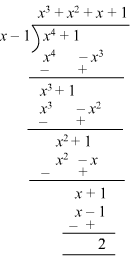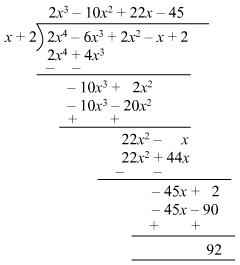RS Aggarwal Solutions: Exercise 2C - Polynomials | Extra Documents & Tests for Class 9 PDF Download
Q.1. By actual division, find the quotient and the remainder when (x4 + 1) is divided by (x – 1).
Verify that remainder = f(1).
Ans. Let f(x) = x4 + 1 and g(x) = x – 1.
Quotient = x3 + x2 + x + 1
Remainder = 2
Verification:
Putting x = 1 in f(x), we get
f(1) = 14 + 1 = 1 + 1 = 2 = Remainder, when f(x) = x4 + 1 is divided by g(x) = x – 1
Q.2. Verify the division algorithm for the polynomials
p(x)=2x4 − 6x3 + 2x2 − x + 2 and g(x) = x + 2.
Ans.
p(x)=2x4 − 6 x3 + 2x2 −x + 2 and g(x) = x + 2
Quotient = 2x3−10x2 + 22x − 45
Remainder = 92
Verification:
Divisor × Quotient + Remainder
=(x+2)×(2x3−10x2 + 22x − 45) + 92
=x(2x3 − 10x2 + 22x − 45) + 2(2x3−10x2+22x − 45) + 92
=2x4 − 10x3 + 22x2 − 45x + 4x3 − 20x2 + 44x − 90 + 92
=2x4 − 6x3 + 2x2 − x + 2
= Dividend
Hence verified.
Q.3. Using the remainder theorem, find the remainder, when p(x) is divided by g(x), where
p(x)=x3−6x2 + 9x + 3, g(x) = x−1.
Ans. p(x)=x3 − 6x2 + 9x + 3
g(x)=x−1
By remainder theorem, when p(x) is divided by (x − 1), then the remainder = p(1).
Putting x = 1 in p(x), we get
p(1)=13 − 6 × 12 + 9 × 1 + 3 = 1 − 6 + 9 + 3 = 7
∴ Remainder = 7
Thus, the remainder when p(x) is divided by g(x) is 7.
Q.4. Using the remainder theorem, find the remainder, when p(x) is divided by g(x), where
p(x)=2x3 − 7x2 + 9x − 13, g(x) = x − 3.
Ans.
p(x)=2x3 − 7x2 + 9x − 13
g(x) = x − 3
By remainder theorem, when p(x) is divided by (x − 3), then the remainder = p(3).
Putting x = 3 in p(x), we get
p(3) = 2×33 − 7×32+9×3−13=54−63+27−13=5
∴ Remainder = 5
Thus, the remainder when p(x) is divided by g(x) is 5.
Q.5. Using the remainder theorem, find the remainder, when p(x) is divided by g(x), where
p(x)=3x4−6x2−8x−2, g(x)=x−2.
Ans.
p(x) = 3x4 − 6x2 − 8x − 2
g(x) = x − 2
By remainder theorem, when p(x) is divided by (x − 2), then the remainder = p(2).
Putting x = 2 in p(x), we get
p(2)=3 × 24 −6 × 22 − 8 × 2 − 2 = 48 − 24− 16 − 2=6
∴ Remainder = 6
Thus, the remainder when p(x) is divided by g(x) is 6.
Q.6. Using the remainder theorem, find the remainder, when p(x) is divided by g(x), where
p(x)=2x3 − 9x2 + x + 15, g(x) = 2x − 3.
Ans.
p(x)=2x3 − 9x2 + x + 15
g(x) = 2x − 3 = 2 
By remainder theorem, when p(x) is divided by (2x − 3), then the remainder = 
Putting  in p(x), we get
in p(x), we get
∴ Remainder = 3
Thus, the remainder when p(x) is divided by g(x) is 3.
Q.7. Using the remainder theorem, find the remainder, when p(x) is divided by g(x), where
p(x)=x3 − 2x2− 8x − 1, g(x) = x + 1.
Ans. p(x)=x3−2x2 − 8x − 1
g(x)=x+1
By remainder theorem, when p(x) is divided by (x + 1), then the remainder = p(−1).
Putting x = −1 in p(x), we get
p(−1)=(−1)3−2×(−1)2−8×(−1)−1=−1−2+8−1=4
∴ Remainder = 4
Thus, the remainder when p(x) is divided by g(x) is 4.
Q.8. Using the remainder theorem, find the remainder, when p(x) is divided by g(x), where
p(x) = 2x3 + x2− 15x − 12, g(x) = x + 2.
Ans.
p(x) = 2x3 + x2 −15x − 12
g(x) = x + 2
By remainder theorem, when p(x) is divided by (x + 2), then the remainder = p(−2).
Putting x = −2 in p(x), we get
p(−2) = 2 × (−2)3 + (−2)2 − 15 × (−2) −12 = −16 + 4 + 30 − 12 = 6
∴ Remainder = 6
Thus, the remainder when p(x) is divided by g(x) is 6.
Q.9. Using the remainder theorem, find the remainder, when p(x) is divided by g(x), where
p(x)=6x3 + 13x2 + 3, g(x) = 3x + 2.
Ans.
p(x) = 6x3 + 13x2 + 3
By remainder theorem, when p(x) is divided by (3x + 2), then the remainder = p 
Putting x =  in p(x), we get
in p(x), we get
∴ Remainder = 7
Thus, the remainder when p(x) is divided by g(x) is 7.
Q.10. Using the remainder theorem, find the remainder, when p(x) is divided by g(x), where
p(x) = x3 − 6x2 + 2x − 4, g (x) = 1 - 
Ans.
p(x)=x3 − 6x2 + 2x − 4
By remainder theorem, when p(x) is divided by  then the remainder =
then the remainder =

Putting x  in p(x), we get
in p(x), we get

∴ Remainder = 
Thus, the remainder when p(x) is divided by g(x) is 
Q.11. Using the remainder theorem, find the remainder, when p(x) is divided by g(x), where
p(x) = 2x3 + 3x2 − 11x − 3, g(x) = 
Ans.
p(x) = 2x3 + 3x2 − 11x − 3
By remainder theorem, when p(x) is divided by  then the remainder =
then the remainder =
Putting x =  in p(x), we get
in p(x), we get

∴ Remainder = 3
Thus, the remainder when p(x) is divided by g(x) is 3.
Q.12. Using the remainder theorem, find the remainder, when p(x) is divided by g(x), where
p(x)=x3 −ax2 + 6x − a, g(x) = x − a.
Ans.
p(x)=x3 − ax2 + 6x − a
g(x) = x − a
By remainder theorem, when p(x) is divided by (x − a), then the remainder = p(a).
Putting x = a in p(x), we get
p(a) = a3 − a × a2 + 6 × a − a = a3 − a3 + 6a − a = 5a
∴ Remainder = 5a
Thus, the remainder when p(x) is divided by g(x) is 5a.
Q.13. The polynomials (2x3 + x2 − ax + 2) and (2x3 − 3x2 −3x + a) when divided by (x – 2) leave the same remainder. Find the value of a.
Ans.
Let f(x) = 2x3 + x2− ax + 2 and g(x)=2x3 − 3x2 − 3x + a.
By remainder theorem, when f(x) is divided by (x – 2), then the remainder = f(2).
Putting x = 2 in f(x), we get
f(2) = 2× 23 + 22 − a × 2 + 2 = 16 + 4 − 2a + 2= −2a + 22
By remainder theorem, when g(x) is divided by (x – 2), then the remainder = g(2).
Putting x = 2 in g(x), we get
g(2) = 2×23 − 3 × 22 − 3 × 2 + a = 16 − 12 − 6 + a = −2 + a
It is given that,
f(2)=g(2)
⇒ −2a + 22 = −2 + a
⇒ −3a = −24
⇒ a = 8
Thus, the value of a is 8.
Q.14. The polynomial p(x) = x4 − 2x3 + 3x2 − ax + b when divided by (x − 1) and (x + 1) leaves the remainders 5 and 19 respectively. Find the values of a and b. Hence, find the remainder when p(x) is divided by (x − 2).
Ans.
Let:
p(x) = x4 − 2x3 + 3x2 − ax + b
Now,
When p(x) is divided by (x−1), the remainder is p(1).
When p(x) is divided by (x+1), the remainder is p(−1).
Thus, we have:
p(1) = (14 − 2 × 13 + 3 × 12 − a × 1 + b)
=(1 − 2 + 3 − a + b)
= 2 − a + b
And,
p(−1)=[(−1)4−2×(−1)3+3×(−1)2−a×(−1)+b]
= (1 + 2 + 3 + a + b)
= 6 + a + b
Now,
2 − a + b = 5 ...(1)
6 + a + b = 19 ...(2)
Adding (1) and (2), we get:
8 + 2b = 24
⇒ 2b = 16
⇒ b = 8
By putting the value of b, we get the value of a, i.e., 5.
∴ a = 5 and b = 8
Now,
f(x) = x4 −2x3 + 3x2 − 5x + 8
Also,
When p(x) is divided by (x−2), the remainder is p(2).
Thus, we have:
p(2)=(24 − 2 × 23+ 3 × 22 − 5 × 2 + 8) [a=5 and b=8]
=(16 − 16 + 12 − 10 + 8)
=10
Q.15. If p(x)=x3 − 5x2 + 4x − 3 and g(x)= x − 2, show that p(x) is not a multiple of g(x).
Ans.
p(x) = x3 − 5x2 + 4x−3
g(x) = x − 2
Putting x = 2 in p(x), we get
p(2) = 23 − 5 × 22 + 4 × 2 − 3 = 8 − 20 + 8 − 3 = − 7 ≠ 0
Therefore, by factor theorem, (x − 2) is not a factor of p(x).
Hence, p(x) is not a multiple of g(x).
Q.16. If p(x) = 2x3 − 11x2 − 4x+5 and g(x) = 2x + 1, show that g(x) is not a factor of p(x).
Ans.
p(x) = 2x3−11x2 − 4x + 5
Putting  in p(x), we get
in p(x), we get

Therefore, by factor theorem, (2x + 1) is not a factor of p(x).
Hence, g(x) is not a factor of p(x).
|
1 videos|228 docs|21 tests
|

|
Explore Courses for Class 9 exam
|

|

















